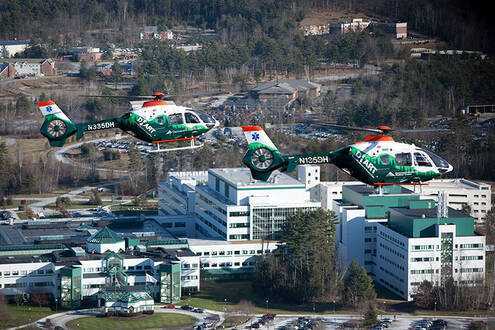
Forget what you've seen in the movies.
In the film Ocean's Thirteen, Elliott Gould's character crumbles to the floor, clutching his chest in a moment of betrayal.
On Designing Women, actor Hal Holbrook looks alarmed while losing an arm-wrestling match. Seconds later, he holds his fist to his chest and mutters, "I can't … breathe."
Heart attacks are more subtle in real life, says Todd Silberstein, DO, a cardiologist at Cheshire Medical Center.
"We just don't see people presenting that way," he says.
So, what happens during a heart attack? Well, it's complicated.
"I think I'm going to die"
Heart attack symptoms can be very different between men and women and can be challenging to recognize. But patients often share a common mindset—doom.
"That sense of patient doom is a pretty typical finding in a serious heart attack," says Jeremiah Goyette, a flight paramedic with the Dartmouth Hitchcock Advanced Response Team (DHART). "When we arrive, the person will often look at you and say, 'I think I'm going to die,' or have a very real sensation of their own mortality."
But the outcome for most heart attack patients is more optimistic. Studies show that over 90% of people survive heart attacks when hospitalized.
Those encouraging statistics are probably not what you're thinking about during a heart attack. That's why Goyette reassures patients they're in steady hands. He'll even share a few jokes and point out local landmarks during the flight.
"I've done this many times, but I know this is your first one," he'll tell a patient on the way to the hospital. "Let's make a rule that unless I look excited, you don't need to look excited."
It's not always a pain in the chest
Symptoms may range from jaw aches, shoulder pain and chest discomfort to sweating and vomiting. Heart attacks can also feel like fatigue, indigestion or heartburn.
Pauline Johansen, RN, was tidying up her yard before hosting a brunch for her grandson's 2021 wedding. "The last thing I remember was raking leaves before waking up in intensive care," she says.
Johansen, 73, suffered a heart attack and sudden cardiac arrest. She was spotted unconscious in her front yard by sisters Emma and Camryn Carey. Guided by a 911 phone dispatcher, Emma Carey performed compressions for more than seven minutes until first responders arrived.
"I was exerting myself more than usual. I was really raking up a storm, gathering brush, working diligently," Johansen recalls, adding that she also felt overtired that week. "I was on a mission."
She's now on a mission to eat healthy and exercise. Her indoor exercise bike, which is accessorized with a touch screen, brings her relaxation and joy as she pedals virtually through Europe and South America.
"I'm a much calmer person since this happened," says Johansen, who has a stent in her coronary arteries and a defibrillator to monitor her heartbeat. "I just try to relax more and take things in stride."
Subscribe to the Living Better newsletter
Your trusted resource for reliable and up-to-date health and wellness information in the Northeast. Get it delivered to your inbox every other week.
How can I tell if I'm having a heart attack?
If you feel tightness or squeezing in your chest, pain spreading from your chest to your arms, dizziness or trouble breathing—call 911. Heart attacks aren't always obvious, but recognizing symptoms will benefit you in the long run.
"The nature of the beast is that you try to ignore the symptoms, thinking it's indigestion or something," says Scott Rogge, MD, a cardiologist at Southwestern Vermont Medical Center. "Most folks eventually get what's happening as they're sweating, short of breath or feel chest pressure."
The last thing you want to do is ignore symptoms.
"Some people pass away at home because they think it's something else or they don't want to acknowledge it's a heart attack," says Rogge. "It's really tragic."
What causes a heart attack?
Most heart attacks are caused by a blockage from cholesterol-containing deposits that form plaque in your arteries. When plaque build-up ruptures, it blocks blood and oxygen from the heart.
Heart attacks can also be from a coronary artery spasm, certain infections and SCAD—a tear inside the heart. Narrow arteries formed by plaque buildup can additionally be to blame.
And if you have pneumonia, a urinary tract infection or another stressor, the demands on your heart become greater and may give rise to cause cells to die in the heart, says Silberstein.
Finding a healthy balance
A heart attack is a big deal. But long-term survival rates are generally on your side, especially with a combination of medication, regular checkups, exercise and a healthy diet.
A positive outlook helps, too. Johansen was dancing at her grandson's wedding two weeks after being rushed to the hospital.
"I was there, and I danced my heart out," she says. "I don't remember much. But I danced!"
Sometimes, real-life stories are better than fiction.
Resources
- Protect Your Heart with These Prevention Tips
- Life After a Heart Attack
- Save a Life: Learn How to Perform Hands-Only CPR
More Dartmouth Health stories
- A day in the life of cardiac rehabilitation nurse manager Kristen Frechette, RN
- How an 86-year-old got out of his wheelchair to adventure again
- How do you know if you have COVID-19, flu, or RSV?


